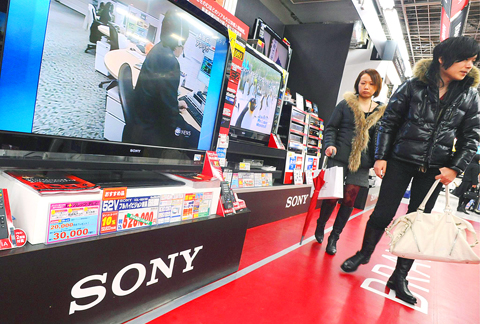Sony Corp slashed its annual earnings forecast yesterday, projecting its first net loss in 14 years on slumping sales, a strong yen and restructuring costs.
The last — and only — time Sony reported a loss, for the fiscal year ending March 1995, the red ink came from one-time losses in its movie division, marred by box office flops and lax cost controls.
The Japanese electronics and entertainment company expects to sink into a ¥150 billion (US$1.7 billion) loss for the fiscal year through March, a reversal from ¥369.4 billion profit the previous year.

PHOTO: EPA
Like other Japanese exporters, Sony is taking a beating from crimped consumer spending during the critical year-end shopping season. The yen’s appreciation and a plunge in gadget prices have also taken a toll.
Sony is particularly vulnerable to the strong yen since about 80 percent of its sales come from overseas. The dollar has dropped to below ¥90 recently from as high as ¥117 last year.
Trouble has been brewing at Sony for some time. In October, it lowered its forecast to a ¥150 billion profit, but it said conditions had worsened since then.
Sony said the slowing economy and price declines were wiping out ¥250 billion in operating profit, while the yen’s appreciation took out another ¥40 billion. Restructuring charges cost ¥30 billion and the declining equity value of its affiliates was a ¥20 billion loss.
Profitability had worsened at its video game and movies units, as well as with its financial businesses in Japan, including an insurer and Internet bank, it said.
Last month, Sony announced widespread cost cuts, including trimming 8,000 of its 185,000 jobs and shutter five or six plants — about 10 percent of its 57 factories. It also said it was cutting an additional 8,000 temporary workers, who aren’t included in the global work force tally.
Sony also plans to reduce its electronics investments by about one-third by the end of March next year.
The moves are expected to deliver more than ¥100 billion in savings a year by March next year, the company said.

MORE VISITORS: The Tourism Administration said that it is seeing positive prospects in its efforts to expand the tourism market in North America and Europe Taiwan has been ranked as the cheapest place in the world to travel to this year, based on a list recommended by NerdWallet. The San Francisco-based personal finance company said that Taiwan topped the list of 16 nations it chose for budget travelers because US tourists do not need visas and travelers can easily have a good meal for less than US$10. A bus ride in Taipei costs just under US$0.50, while subway rides start at US$0.60, the firm said, adding that public transportation in Taiwan is easy to navigate. The firm also called Taiwan a “food lover’s paradise,” citing inexpensive breakfast stalls

TRADE: A mandatory declaration of origin for manufactured goods bound for the US is to take effect on May 7 to block China from exploiting Taiwan’s trade channels All products manufactured in Taiwan and exported to the US must include a signed declaration of origin starting on May 7, the Bureau of Foreign Trade announced yesterday. US President Donald Trump on April 2 imposed a 32 percent tariff on imports from Taiwan, but one week later announced a 90-day pause on its implementation. However, a universal 10 percent tariff was immediately applied to most imports from around the world. On April 12, the Trump administration further exempted computers, smartphones and semiconductors from the new tariffs. In response, President William Lai’s (賴清德) administration has introduced a series of countermeasures to support affected

CROSS-STRAIT: The vast majority of Taiwanese support maintaining the ‘status quo,’ while concern is rising about Beijing’s influence operations More than eight out of 10 Taiwanese reject Beijing’s “one country, two systems” framework for cross-strait relations, according to a survey released by the Mainland Affairs Council (MAC) on Thursday. The MAC’s latest quarterly survey found that 84.4 percent of respondents opposed Beijing’s “one country, two systems” formula for handling cross-strait relations — a figure consistent with past polling. Over the past three years, opposition to the framework has remained high, ranging from a low of 83.6 percent in April 2023 to a peak of 89.6 percent in April last year. In the most recent poll, 82.5 percent also rejected China’s

PLUGGING HOLES: The amendments would bring the legislation in line with systems found in other countries such as Japan and the US, Legislator Chen Kuan-ting said Democratic Progressive Party (DPP) Legislator Chen Kuan-ting (陳冠廷) has proposed amending national security legislation amid a spate of espionage cases. Potential gaps in security vetting procedures for personnel with access to sensitive information prompted him to propose the amendments, which would introduce changes to Article 14 of the Classified National Security Information Protection Act (國家機密保護法), Chen said yesterday. The proposal, which aims to enhance interagency vetting procedures and reduce the risk of classified information leaks, would establish a comprehensive security clearance system in Taiwan, he said. The amendment would require character and loyalty checks for civil servants and intelligence personnel prior to